The Environment in Western Senate Races
Air Date: Week of October 9, 2020

Republican Senator Steve Daines of Montana delivering remarks just prior to President Trump signing the Great American Outdoors Act. (Photo: Tia Dufour, The White House, Public Domain)
Three of this year's closest Senate races are in the western states of Colorado, Montana, and Arizona, places with a lot of public lands and where environmental issues are top of mind for voters. Yet all three Senate seats on the ballot in these states are currently held by Republican incumbents, with varying commitments to climate and environmental protection. Judy Fahys, a reporter for InsideClimate News, speaks with Host Bobby Bascomb about where the candidates stand on climate and the environment.
Transcript
BASCOMB: The White House corona virus outbreak has shifted the conversation in favor of Joe Biden, and the prospects for Democrats to take a number of Senate seats. We turn now to the Rocky Mountain west – Montana, Colorado, and Arizona where there are vast amounts of public land and an electorate who value the outdoors for activities like fishing, hunting, hiking, camping and skiing. In fact, the right to a "clean and healthful environment" is even in the state constitution of Montana. Yet all three Senate seats up for election in the region are currently held by Republicans with varying commitments to environmental protection. For more I’m joined now by Inside Climate News reporter Judy Fahys. Judy, welcome to Living on Earth.
FAHYS: Hi, thanks for having me.
BASCOMB: Well, let's start with Colorado, where Republican incumbent Cory Gardner is looking to defend his seat from a Democratic former governor John Hickenlooper. Now Mr. Gardner actually sponsored the Great American outdoors Act, which was a bipartisan bill passed this year, providing funding for the Land and Water Conservation Fund, along with the country's national parks, but he has an 11% lifetime score from the League of Conservation Voters, meaning he's voted in a way that LCV views as favoring the environment just 11% of the time, that's pretty abysmal. How do you square that circle?
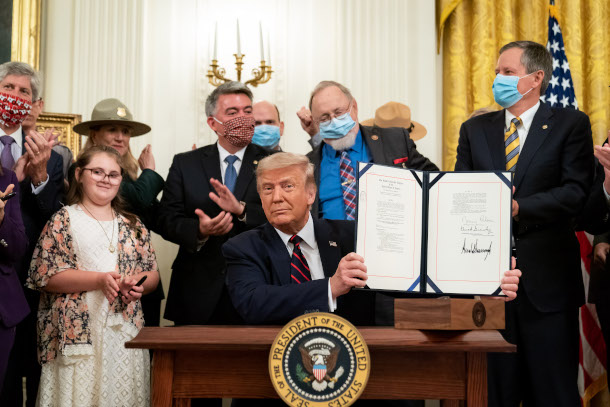
Republican Senators Steve Daines (far right of photo) of Montana and Cory Gardner of Colorado (back left of President Trump), among others, look on as President Trump displays his signature on the Great American Outdoors Act. (Photo: Tia Dufour, The White House, Public Domain)
FAHYS: So, Cory Gardner and Steve Daines went to probably the Republican leadership but definitely to the president in the last year or so. And basically said, look, we really need to appeal to our conservation minded voters in the West because even people who like to hunt and fish, consider the public land, their land as well. And they really care about protecting the environment.
BASCOMB: And you mentioned that Steve Daines was one of those supporters. He's the republican senator from Montana that we'll talk about a bit later.
FAHYS: Right, right. Daines and Gardner were the two people who went to the Republican leaders and the president and asked for support. And they gave that support, because they knew that the elections in both of those states would be pretty tight. And then in March, Senator Daines and Senator Gardner went to the president and said, look, could you give us the Great American Outdoors Act? Could you help us get that passed? And the president said, okay, I'll support that. And lo and behold, by the end of the summer, this elusive funding of like $900 million dollars a year for public lands, and parks around the country was freed up, and Daines and Gardner again, because of their touchy election situation, they got this vote to move forward and they were successful.
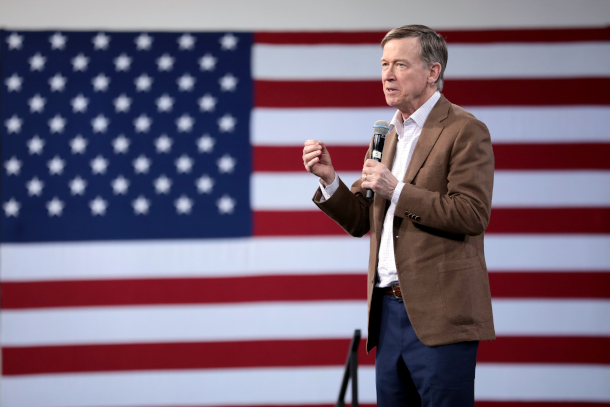
Former Democratic Governor John Hickenlooper of Colorado is running for Gardner’s Senate seat. (Photo: Gage Skidmore, Flickr, CC BY-SA 2.0)
BASCOMB: Now, Colorado is more of a purple state, they're turning blue slowly, but surely, it seems. And people that really enjoy the outdoors. I actually lived in Colorado for a time and it seems everybody's either into mountain biking, hiking, skiing, people really, really value their public lands. So this seems like a no brainer for him to support. But with an 11% lifetime score from the LCV, where else does he stand when it comes to climate change and the environment more broadly, not just with public lands?
FAHYS: Yeah. You know, Cory Gardner actually had done a little bit of work on his committees, trying to get money for the National Renewable Energy Laboratory, which is actually based in Colorado. And he, like a lot of Republicans these days are talking about technology as a solution to climate change. They don't really say, you know, this is a crisis. But they do say this is something that we can do something about, and let's look to technology to answer the question. So on the one hand, he does have a lot of support from the energy industry. But on the other hand, he has not really been what you would call a strong supporter of pro climate legislation and pro climate policies. He doesn't favor the Green New Deal, but again, I don't think John Hickenlooper does, either. Also, Senator Gardner doesn't support the Paris Climate Agreement. So that's actually one distinguishing point, I think between him and John Hickenlooper, his Democratic opponent.
BASCOMB: Well, let's talk more about john Hickenlooper. He's been the mayor of Denver, governor of Colorado, he briefly threw in his hat in the ring for the Democratic presidential nomination last year. But before politics, he was a petroleum geologist. That's a person who looks for oil and gas to extract. Can you tell us more about Mr. Hickenlooper's environmental track record?
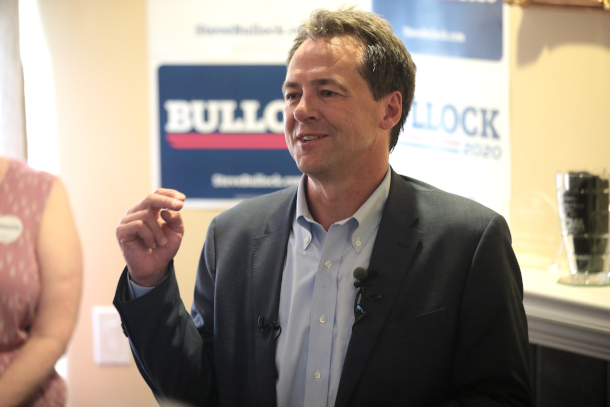
Governor Steve Bullock, a Democrat in Montana, is running for Steve Daines’ Senate seat. (Photo: Gage Skidmore, Flickr, CC BY-SA 2.0)
FAHYS: Well, that's also been really fascinating to watch the evolution back in 2017, then Governor Hickenlooper asked for a climate plan for the state and that actually has been delivered. And he's been actually a big supporter as both the mayor and the governor of increasing electric vehicles and expanding energy efficiency and expanding renewables. But he also has been considered kind of a friend, or at least moderate on issues about energy and mining. I think he's been walking kind of a fine line. And maybe it's sort of the opposite reflection of what Cory Gardner is in. They both have to seem like they're kind of moderate because it isn't a blue state or a red state. It's a purple state.
BASCOMB: Well, let's move along to the Montana race, where Republican incumbent Steve Daines is up against Democratic governor Steve Bullock.
FAHYS: That's also I enjoyed so much reporting the Montana story because Montana politics are just so lively. Currently, Steve Daines and Steve Bullock are about a point apart in the polls. The race has moved from Bullock leading to Daines leading after the passage of the Great American Outdoors Act was talked about earlier.
BASCOMB: And where did the candidate stand more broadly when it comes to the issue of climate change in Montana?
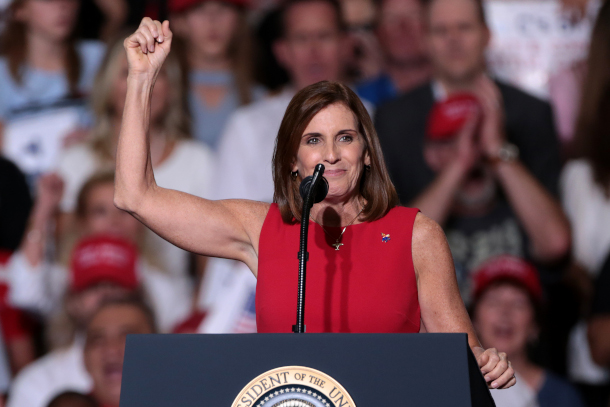
Republican Martha McSally is running for reelection in Arizona’s special election. (Photo: Gage Skidmore, Flickr, CC BY-SA 2.0)
FAHYS: Yeah, Steve Bullock actually was a presidential candidate over the last year. And you know a lot more about where he stands on climate change because climate change was a question that was put to all of the Democratic candidates in the early part of the race. He supports the Paris Climate Accord, he thinks a climate action is urgent. And in fact, there was a great headline to a New York Times column that said that Steve Bullock was actually the most important person on the planet. And that was because the more Democrats that are elected in this election to the Senate, the more likely it is that the Senate will be able to take action on climate change, which has been blocked by Senator Mitch McConnell.
BASCOMB: Well, let's turn to Arizona now, Arizona shattered all sorts of heat records this summer. To what degree is climate change on the minds of voters there?
FAHYS: You know, it's actually a fairly significant issue for Arizona, they've had a series of years where the number of heat deaths are going up and heat waves are kind of a part of life. Meanwhile, water from the Colorado River Basin is declining. And they rely on that water to sustain their communities and to sustain their growth.
BASCOMB: Now, Arizona's race is a special election to fill the seat of former senator John McCain. The seat is currently held by Martha McSally, who was appointed by the Republican governor there in Arizona, and McSally faces Democrat Mark Kelly, a former astronaut. What have each of these candidates had to say on climate change in the environment?
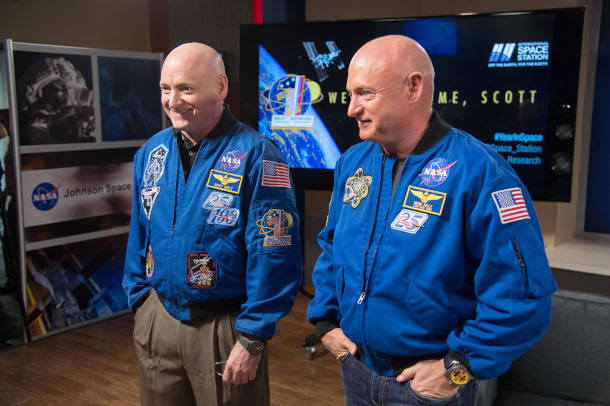
Former astronaut Mark Kelly (right) is running as a Democratic candidate for U.S. Senate in Arizona’s special election. (Photo: NASA, Flickr, CC BY-NC 2.0)
FAHYS: Well, Martha McSally is also a member of the Senate resources, Natural Resources Committee. And she really hasn't talked a lot about climate change, except to the extent that she talks about energy technology. And she recognizes that water is a an issue that needs to be addressed. But it's actually kind of interesting because Mark Kelly is married to Gabby Giffords, the Congresswoman who was shot and almost killed in 2011. And this is his first run at public office. He's been bringing the climate change question to the race in an interesting way. He talks about watching the earth change from space. And he talks about how it looked different, even over the 10 years of his different flights into space. He could see deforestation, for instance, and that that affected him. Like other Democrats, he talks about clean energy jobs and how that could help advance climate action, while also improving the economic and social status of the people in his state.
BASCOMB: Well, all of these western states that we've been talking about, Colorado, Montana and Arizona, they are all very dry. They're at high risk for wildfires and home to vast amounts of public lands that people really enjoy there. Generally speaking, how important do you think climate change and the environment are for voters there?
FAHYS: There's an organization called Colorado College, which puts out a poll every year for the last 10 years, called the State of the Rockies. And in those polls, the voters say that how candidates talk about clean air, clean water, and the environment in general factors into the votes of about 80% of the people in the West. And that's true of Arizona and Colorado, and Montana. So it's a really important factor. People care about the land that they live on and the air that they breathe. This summer in the West wildfire has polluted the air across the country. But it's particularly important in the West.
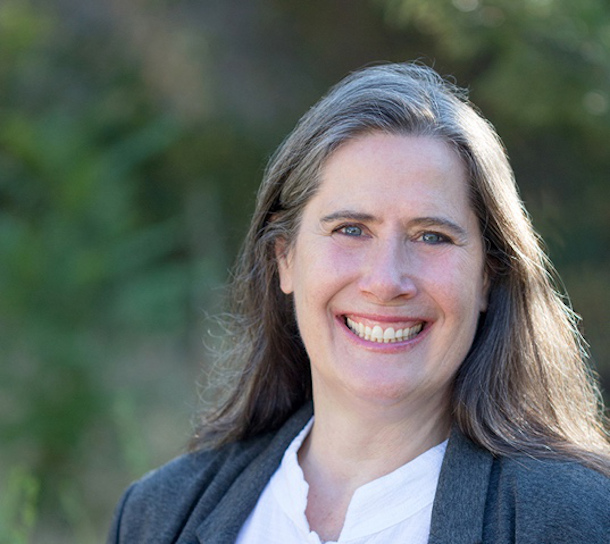
Judy Fahys is a reporter for InsideClimate News. (Photo: Courtesy of Judy Fahys)
BASCOMB: Judy Fahys is a reporter for Inside Climate News. Judy, thank you so much for taking this time with me today.
FAHYS: Thank you.
Links
ICYMI: LOE's coverage of the Maine Senate race
ICYMI: LOE's discussion about four key Southern Senate races
Living on Earth wants to hear from you!
Living on Earth
62 Calef Highway, Suite 212
Lee, NH 03861
Telephone: 617-287-4121
E-mail: comments@loe.org
Newsletter [Click here]
Donate to Living on Earth!
Living on Earth is an independent media program and relies entirely on contributions from listeners and institutions supporting public service. Please donate now to preserve an independent environmental voice.
NewsletterLiving on Earth offers a weekly delivery of the show's rundown to your mailbox. Sign up for our newsletter today!
 Sailors For The Sea: Be the change you want to sea.
Sailors For The Sea: Be the change you want to sea.
 The Grantham Foundation for the Protection of the Environment: Committed to protecting and improving the health of the global environment.
The Grantham Foundation for the Protection of the Environment: Committed to protecting and improving the health of the global environment.
 Contribute to Living on Earth and receive, as our gift to you, an archival print of one of Mark Seth Lender's extraordinary wildlife photographs. Follow the link to see Mark's current collection of photographs.
Contribute to Living on Earth and receive, as our gift to you, an archival print of one of Mark Seth Lender's extraordinary wildlife photographs. Follow the link to see Mark's current collection of photographs.
 Buy a signed copy of Mark Seth Lender's book Smeagull the Seagull & support Living on Earth
Buy a signed copy of Mark Seth Lender's book Smeagull the Seagull & support Living on Earth

